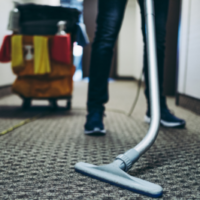I didn’t always have it together. Growing up, I was in and out of jail, learning more from the streets than from school. I dropped out, but I made sure to pick up the basics—reading, writing, doing what I had to do to get by. A lot of what I know, I learned the hard way. I had to grow up fast, take care of responsibilities before I was even ready.
But even behind bars, I was learning. I figured out how to read and write properly, how to be a man. When I got out, I didn’t want to waste time. I picked up skills—truck driving, operating forklifts, working in warehouses and kitchens, even landscaping and construction.
I built myself up, made sure I had something to stand on.
Life didn’t make it easy, though. I came home from prison at 21, but by 25, I was back—this time, in federal prison. That changed things. I met people who taught me about credit, about fixing my finances, and how to move forward. I took all of that in because I knew I couldn’t keep going in circles.
But coming home with a record? That’s a whole other challenge.
In Florida, it’s tough to get a good job with a background like mine. I’ve seen guys in D.C. come out of prison and land jobs at the post office or FedEx—places that wouldn’t even look at me here. The laws in Florida are just different.
Right now, I’m still on federal probation, but I’ve only got four months left. I came home in October 2022, and this is the longest I’ve ever stayed out. I plan to keep it that way.
I got married in November 2023. My wife and I have blended family, 11 kids between us. She’s solid, works for the post office, has her Commercial Driver License (CDL). She’s been pushing me to get my CDL too, and I’m working on it. I used to drive trucks before and I liked it. There’s a peace of mind in it—no supervisor breathing down your neck, just you and the road.
Finding steady work has been the hardest part. I got a job at Mattress Firm through an agency, learned the job fast, and was ready to stay. I worked as a selector, preparing the shipments, and I learned the computer systems. There was no limit to what we could achieve there. But when it came time for them to hire me permanently, they dropped me because of my background. It’s frustrating.
Now that I’m out, my goal is clear: to build something meaningful, not just for myself but for my family and for others who’ve been in my shoes.
I want to go beyond the bars that once held me back.
But Florida makes it hard for me. My record follows me everywhere, making it almost impossible to find stable work.
I’ve tried everything—labor pools, temp jobs, anything to provide—but those only pay so much. I don’t mind hard work, but if you settle for less, you get less. And I know I’m worth more. My mind is “beyond the bars”, beyond the limitations that society places on me.
Before I was incarcerated, labor pools were a different game. I could wake up, grab a ticket, work a shift, and still make it to my second job. I was grinding, making things happen. Now, everything’s changed. Technology, policies, attitudes—it’s just different. It’s harder.
When I was in the halfway house, I found out too late that Publix had a program that could have helped me get a job. If I had known, I’d be working there right now. But I didn’t, and by the time I got out, that opportunity was gone.
I’ve asked my probation officer for help, but the system isn’t built to support people like me. They’ll put you in a drug program in a heartbeat if you mess up, but they won’t help you find a job to keep you from slipping in the first place. They search your car, make sure you’re clean, but won’t connect you with stable employment. It feels like they’re waiting for you to fail rather than setting you up to succeed. And that’s a fight I’m willing to take on, not just for me, but for others in my position.
A good job isn’t just about a paycheck; it’s about building a future. Something like the post office, a trade, or starting my own business—something lasting. I’ve had jobs where I proved myself, earned certifications, only to be blocked from moving up. Management sees your drive, your ambition, and instead of lifting you up, they hold you back. That’s happened to me more times than I can count.
My biggest dream is to buy land, build a home for my family, and create a center that helps people like me—people who want a second chance. I have a lot of kids, and my wife and I want one more, bringing us to twelve. That’s twelve lives I’m responsible for, twelve futures I need to secure. I don’t want them to experience the struggles I went through. They deserve stability, opportunities, and a father who leaves behind a legacy of change, not mistakes.
I grew up in St. Louis, Missouri. My parents were present in my life, even though my father was incarcerated for a time. But he turned his life around, and that gives me hope. He never smoked or drank, neither did my mother. They set an example of discipline, even if life pulled me in another direction for a while.
Now, I want to build a home like the one I remember from my childhood—before everything changed. My kids are doing well in school, and that’s a blessing. That’s what keeps me going. I want to keep it that way. I want them to graduate, to succeed in ways I never did.
That’s the thing—opportunity is everything. And if you don’t have a support system, it’s even harder. I was lucky to have family help me get a job at Wingstop, but what about people who don’t have that? The system should be designed to help us reintegrate, not make it harder.
That’s why I’m pushing for change. I want to build something bigger than myself, something that helps others avoid the struggles I’ve faced.
I’m ready for whatever comes next. I know that “beyond the bars” is more than just an idea—it’s my purpose. And I won’t stop until I make it a reality.



